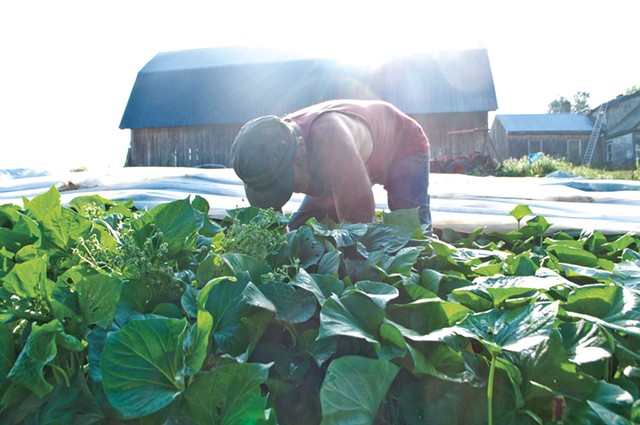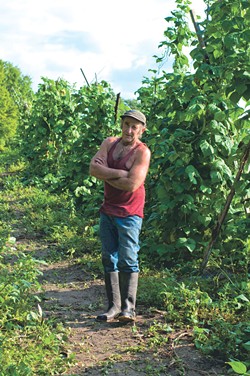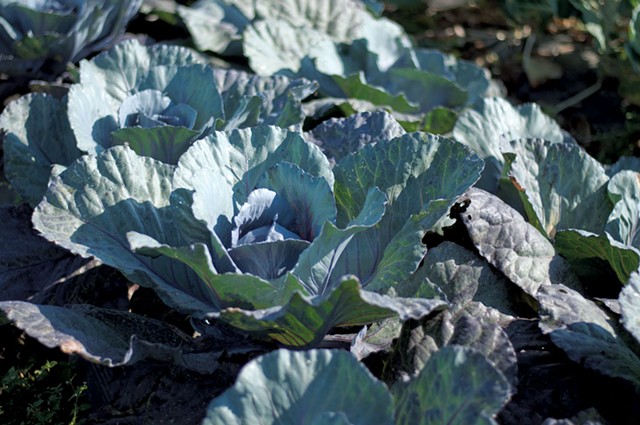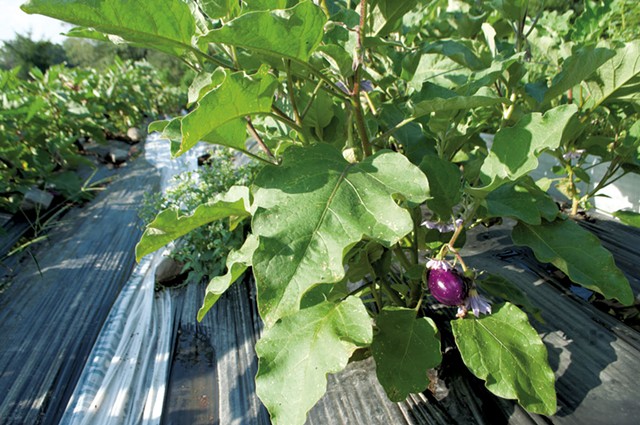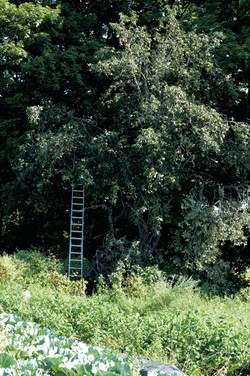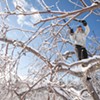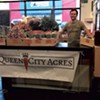Published September 2, 2015 at 10:00 a.m. | Updated September 7, 2015 at 11:20 a.m.
Alan LePage lifts the willowy white fabric blanketing a row of sweet potatoes. "These thrive in 90 to 100 degrees," he says. "You can get slow growth at 80, but any lower than that — nothing. We try to control every aspect of their environment." The roots and suckling yams grow insulated under black weed cloth, while the vines, sprouting with waxy, heart-shaped leaves, wander and bush beneath the heat-conserving veil.
Next, he turns to the okra a few rows away. "This is one of the most beautiful sights in existence," the farmer says, massaging a flower open with cracked, soil-sodden fingers. Yellow petals twist out from a dark inner eye — an odd, tropical bloom smuggled to the New World when African slaves tucked seed pods into their hair, LePage says. "These are not necessarily something I make money on," he admits, "but they do arouse people's curiosity."
These hot-weather crops thrive in the rocky, glacial-till hills above Barre, along with more than 100 other fruits, legumes, herbs and tubers, which LePage cultivates with help from four on-farm apprentices. Many of these are rare, even in this age of the everyman-gastronome and his heirloom harvest.
Most Vermont farmers growing similar arrays wholesale their esoteric bounties to restaurants and co-ops, where chefs and shoppers value their culinary qualities. Aided by season-extending greenhouses and cold storage, these farms start pumping summer produce into the market as soon as the weather warms.
But that model doesn't work for LePage, who eschews working in large quantities and spending too much time under plastic domes. Over the years, he says, "The message from restaurants was that they wanted what they wanted — when they wanted it. If they couldn't get it from me, they'd get it somewhere else."
Planted and harvested mostly in the brief period between frosts, LePage's garden proliferates in an embarrassment of riches for a couple of months, starting in August. Fast-growing greens, radishes and herbs bookend that abundance in spring and early summer, while long-keeping cabbages and root vegetables anchor fall and winter.
The farmer sells most of that at markets in Barre and Montpelier, where he brings in $1,000 to $3,000 per market. Though he could make more if he scaled up or planted earlier, his practice — scattered across 40 acres, much of that unplanted — allows him to keep his overhead to a controllable level and to personally handle every plant. "I don't want to be a 30-, 40-, 100-acre farm," he says. "I like the craftsmanship in small acreage and diverse crops."
And LePage likes direct sales. "I'd rather deal with the people who are consuming my food," he explains. "Whatever I get at market, I enjoy it. I have religious customers who have been buying from me for 40 years."
An ardent community activist and host of WGDR-FM's weekly radio show, "The Curse of the Golden Turnip," at Goddard College, LePage was a founding member of the Barre Farmers Market, Montpelier's Hunger Mountain Co-op and Green Mountain Produce, a distributor of sorts that linked Vermont farms with customers in Boston back in the 1980s. And these are just some of his local ag initiatives.
Talk with the farmer — who no longer certifies as organic but operates as such — about produce, and the conversation meanders to cooking, anthropology, land use, government, the economy and social class. Around the farm, his politics bleed into practice.
For example, a new cabbage-storage house, tucked into the woods at the edge of a field, is constructed with scrap roofing tin and other miscellany collected over the years. "You end up with a lot less trash out there in the world," LePage says of his tendency to hoard potential building materials. "You may have more [clutter] on your little spot, but you never know when it'll come in handy," he adds.
During conversations on the farm and via phone, LePage swings from elation — at growing beautiful food in his ancestral home and living a self-determined life of learning and stewardship — to defeat at the lack of return he's found in doing so.
But right now, he's talking eggplants. "The heat wave just gave these a chance at existence," he says, holding a long green aubergine. "These — they're hard to grow. In a year like this, I get one or two per plant. And they don't sell that well."
Then why grow them?
"I guess I enjoy having a diversity of things," he says. "Just having them is important."
LePage points to another of the seven varieties of eggplant he planted this year. "The flavor! Or the texture! It's hard to separate, but these have this texture — almost like pudding," the farmer raves. "I enjoy having things that are supremely flavorful."
When LePage left Barre for Columbia University in 1970, he didn't really plan to return. He fell in love with, and then married, a New York City girl. Then, in 1976, the young scholar brought his bride back to the family farm, fueled by an obsession with food, cooking and quality ingredients.
A philosophy major in college, LePage began to realize that flavor — its botany, history and anthropology; its relationship to soils and chemistry and time and season, to policy and government and social class — was something he could spend his life investigating and, perhaps more importantly, creating.
Though his forebears had farmed the same plot for 150 years, LePage returned to an empty farmhouse and fields overgrown with 10-foot saplings. His father — who turned away from agriculture after watching his own father and grandfather toil endlessly over the land — discouraged his son from farming. "At that time farming was considered a déclassé occupation," LePage says. "What's the point of working for yourself when all it is is a struggle like that?"
He recalls these admonitions on a sunny morning, standing among sculptural, multicolor cabbages. The field overlooks the rolling green hills of western Washington County; Camel's Hump looms pale in the blue beyond. His young workers chatter nearby, picking vegetables for the afternoon's market. "Now that I'm 63," LePage says, "I guess he was right. But I don't think I'd change anything."
In 1976, there were no farmers markets. The word "locavore" didn't exist, and never mind "organic." "You didn't mention [the word 'organic'] to a farmer without ridicule," LePage says. "That was for wingdings at the Rodale Institute," he adds, referring to the Pennsylvania research farm where former playwright Jerome Irving Rodale began reviving traditional agricultural practices in the late 1940s.
Despite the current vogue surrounding small farms, organic agriculture and artisanal ingredients — and the corresponding increase in prices since the 1970s, when a head of lettuce could fetch 15 cents — the farmer says he has saved little in 40 years. The farm and his ability to coax food from it are his main assets. The day he stops working is the day he'll start falling behind with the tax man.
All of this weighs heavily on him now because, as his body begins to tire, LePage has yet to cement a succession plan. "I have thought about it," he says later via phone. "I want [this land] to be farmed." Prospects have expressed interest in a long-term partnership that would preserve the farm's legacy, but it's a sensitive situation. "My family lives all around here," he says. "I have two brothers and a sister, and they wouldn't want [the farm] to leave the family."
But none of his children or relatives seems inclined to take over, which lands LePage in the same predicament his grandfather faced all those decades ago. It's a common enough story. "There are a lot of family farmers whose kids are less than enthusiastic about the old guys' obsessions with dairy or vegetables or whatever it is," LePage says. "Kids grow up on a farm and see how hard people have to work. It makes working at Cumberland Farms look like a piece of cake."
If all else fails, housing lots in this corner of Barre go for $50,000 apiece. "If I wanted to sit on my butt for the rest of my life, all I'd have to do would be to sell some land," LePage says. But his tone suggests he'd rather die with a hoe in hand than cave to development.
Back on the farm, he picks up two apples fallen from a tree planted a century ago.
"Good year for apples," says his visitor, surveying the branches weighted with fruit.
"It's extraordinary," LePage says, eyes shining beneath the crooked brim of his hat. "I'm getting my cider press out of mothballs."
LePage Farm produce can be found at the Barre Farmers Market on Wednesdays and Saturdays, and at Capital City Farmers Market in Montpelier on Saturdays.
"The Curse of the Golden Turnip" airs on Sundays, 6-9 a.m., on WGDR-FM 91.1/91.7. wgdr.org
The original print version of this article was headlined "Landed History"
More By This Author
Speaking of...
-

Barre to Sell Two Parking Lots for $1 to Housing Developer
Apr 22, 2024 -

At Studio Place Arts in Barre, a Group Exhibit Highlights Embroidery
Apr 10, 2024 -

Backstory: July Flood Hit 'Closest to Home' for Barre-Raised Reporter Courtney Lamdin
Dec 27, 2023 -

Volunteers Create Quilts for Residents at Barre-Area Homeless Shelters
Nov 1, 2023 -

Elinor Randall’s Prints Leave ‘Deep Impressions’ at Studio Place Arts
Sep 20, 2023 - More »
Comments
Comments are closed.
From 2014-2020, Seven Days allowed readers to comment on all stories posted on our website. While we've appreciated the suggestions and insights, right now Seven Days is prioritizing our core mission — producing high-quality, responsible local journalism — over moderating online debates between readers.
To criticize, correct or praise our reporting, please send us a letter to the editor or send us a tip. We’ll check it out and report the results.
Online comments may return when we have better tech tools for managing them. Thanks for reading.



































